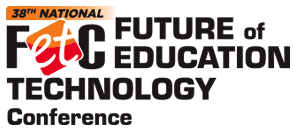Curriculum suffers when technology gets in the wayHear more from Steven Anderson and other innovative analysts, thought leaders, and educators at the 2018 Future of Education Technology Conference (FETC), January 23-26 in Orlando, Florida. Learn more here.
 Steven W. Anderson is an accomplished education consultant who travels from coast to coast talking about the use of Social Media in the classroom to teachers and administrators in schools and districts all across the country.
Steven W. Anderson is an accomplished education consultant who travels from coast to coast talking about the use of Social Media in the classroom to teachers and administrators in schools and districts all across the country.
“School is really about teaching kids how to be good learners, how to be critical thinkers and how to be innovators,” he says. “We have to put processes in place to support that. And one of the ways we can do that is by providing choice and thinking about the devices and applications we use to accomplish that.” Steven is of the opinion that technology has fueled the “flipped classroom” philosophy, and he opposes the concept. He says that schools and districts rely too heavily on the technology because they spend vast sums of money on a single platform or digital curriculum, and demand a higher return on investment (ROI). Districts usually make this decision for a good reason; a single platform is easier to service, repair, and support than multiple devices and platforms.
With a flipped classroom where the students are allowed to bring their devices home, schools expect the student to continue learning after school. Mr. Anderson says that this is wishful thinking at best. “Kids need an opportunity to be kids,” he says. “Kids need to have the opportunity to go away from school and to not do school. So expecting them to come to school for eight hours a day and then go home and watch that teacher for another thirty minutes or an hour or more is a lot to ask. None of us would go away from our jobs after working an eight-hour day and then be excited to back and do more work for several hours afterward.”
 To Steven, quality professional development is a critical tool in helping schools keep up with the constantly shifting education technology and the variety of electronic devices that parade through classrooms on a daily basis. “One of the issues that I have a lot with professional development in some conferences, they’re trying to cram the technology into the learning process versus ‘Let’s talk about how collaborative classrooms through the use of technology work and what they look like.’ Technology comes and goes. What we need to be focused on are pedagogy and processes and how students are creating new knowledge and new opportunities through that technology. And technology enables us to do things we weren’t able to do before.”
To Steven, quality professional development is a critical tool in helping schools keep up with the constantly shifting education technology and the variety of electronic devices that parade through classrooms on a daily basis. “One of the issues that I have a lot with professional development in some conferences, they’re trying to cram the technology into the learning process versus ‘Let’s talk about how collaborative classrooms through the use of technology work and what they look like.’ Technology comes and goes. What we need to be focused on are pedagogy and processes and how students are creating new knowledge and new opportunities through that technology. And technology enables us to do things we weren’t able to do before.”
He reminds educators and administrators of three things they need to remember to help them get the most out of the conference and professional development experience.
One, make sure that they share their learning with someone else. “A lot of times, folks get to go to conferences and they’re the only one from their school or the only one from their district,” he says. “It’s important for them to go back and share that information either by writing a blog post or having a meeting and letting everybody know the great things that were learned.”
Second, they need to reflect on their learning. Steve says, “I think that’s important because when you take the time to sit back and reflect and think about what you saw and heard and how that can affect learning in and out of the classroom. I think that’s super important.”
And lastly, he thinks it is most important to go to talks and presentations and take in things that you may not understand or be in disagreement. “Don’t just go to the sessions that align with the people you like or the topics you like,” He cautions. “You may walk away not learning anything. I’m a staunch advocate against flipped classrooms, so I always try to go to those sessions to hear as many people as possible talk about how they’re doing it because maybe, ultimately, I might see it from a new perspective or hear a different opinion. And that’s important to me. It pushes me as a learner.”
 “We get too hyper-focused on one particular application and then tomorrow it’s gone, and we haven’t understood the processes that made that application so great,” he says. “We’re at a loss. I want to see schools, districts and educators focusing more on their pedagogy and having good solid sound pedagogy around the use of technology.”
“We get too hyper-focused on one particular application and then tomorrow it’s gone, and we haven’t understood the processes that made that application so great,” he says. “We’re at a loss. I want to see schools, districts and educators focusing more on their pedagogy and having good solid sound pedagogy around the use of technology.”
While Steven is excited about the technology available to current and future generations, he continually advocates for curriculum and pedagogy entirely separate from technology. He believes that tech is simply a delivery tool and should not be the centerpiece of a child’s education. “I don’t focus on tools. I focus on processes because the tool doesn’t matter,” he says. “There are hundreds of tools that do all the same thing. What’s more important is the process and the pedagogy around the tools.”
About Steven W. Anderson:
 Steven W. Anderson is a Dad, Learning Evangelist, Speaker and Author. After a successful career in public education as a Teacher, Instructional Technologist, and Director of Instructional Technology, Steven works with educators across the globe as a consultant. Highly sought after for his skills in helping educators and school leaders better understand technology and social media through his humorous approach to learning, Steven can work with you to improve learning for all students.
Steven W. Anderson is a Dad, Learning Evangelist, Speaker and Author. After a successful career in public education as a Teacher, Instructional Technologist, and Director of Instructional Technology, Steven works with educators across the globe as a consultant. Highly sought after for his skills in helping educators and school leaders better understand technology and social media through his humorous approach to learning, Steven can work with you to improve learning for all students.
See more at https://web.archive.org/web/20240226132410/https://www.web20classroom.org/ and follow Steven W. Anderson on Twitter.
Books:
The Relevant Educator: How Connectedness Empowers Learning
Co-authored with his good friend and influential social media educator Tom Whitby. Steven and Tom take educators through their journey of how social media made them the learners and educators they are today, while providing practical tips how others can do the same.
Written with school leaders in mind, this text takes the reader through 3 different parts of the leadership process (communication, collaboration and organization) and how digital tools can enhance a leader’s ability to do their work effectively while being a model of technology use for teachers and students.
Content Curation: How To Avoid Information Overload
In an age where educators and students have access to a plethora of information at their fingertips understanding how to collect, organize and share resources is crucial. In this book, Steven walks educators through the curation process and provides several digital tools and examples to use both for professional learning and to also help students be better curators.
 Steven Anderson will be presenting at the upcoming Future of Education Conference (FETC) January 23-26 in Orlando, Florida.
Steven Anderson will be presenting at the upcoming Future of Education Conference (FETC) January 23-26 in Orlando, Florida.
AuthorDr. Berger is one of many industry education correspondents for the Mind Rocket Media Group, An educator and former school administrator. He often hosts education panel discussions and develops strategic content. As an academic Dr. Berger is a guest lecturer at Vanderbilt University’s Owen Graduate School of Management. A former assistant principal, he has been an adjunct undergraduate professor and developer of online college courses. He is a passionate Detroit sports fan who has also adopted Nashville sports teams as his own.
Contact the Mind Rocket Media Group if you are interested in an industry interview and a placement on EdCircuit.
Further Reading
- Inside Higher Ed – Teaching and Learning: Lost in a Buzzword Wasteland
- eduBuzz – Initial teacher education: pedagogy vs technology
- EdSurge – Why Every School’s Edtech Department Should Make Themselves Obsolete





